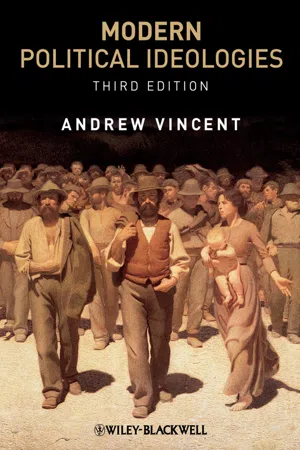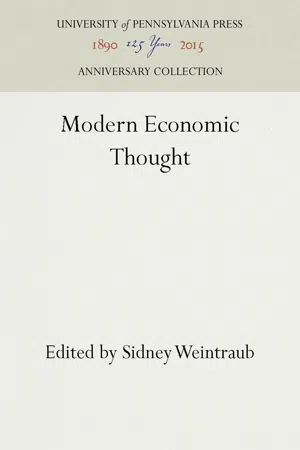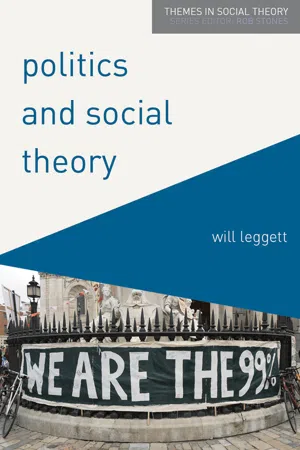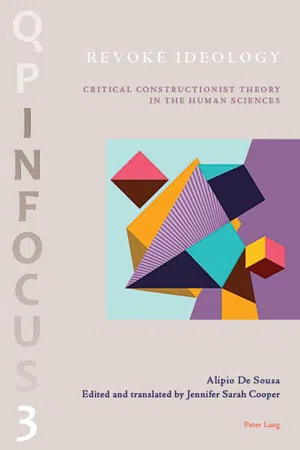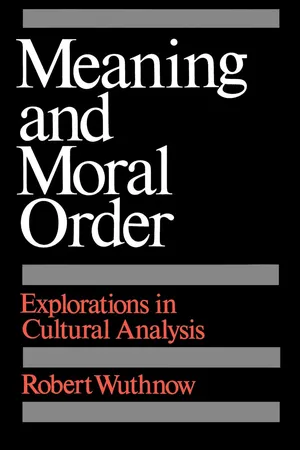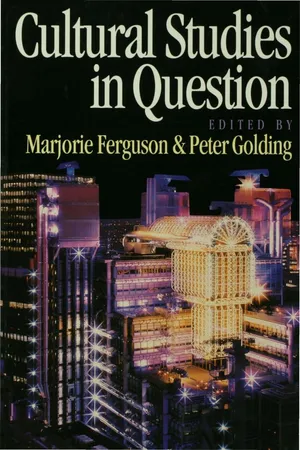Social Sciences
Ideology
Ideology refers to a system of beliefs, values, and ideas that shape and influence an individual's or group's understanding of the world. It encompasses political, social, and cultural perspectives and often serves as a framework for interpreting and justifying actions and policies. Ideologies can be influential in shaping societal norms, power structures, and individual behaviors.
Written by Perlego with AI-assistance
Related key terms
1 of 5
6 Key excerpts on "Ideology"
- eBook - PDF
- Andrew Vincent(Author)
- 2009(Publication Date)
- Wiley-Blackwell(Publisher)
Ideology can also signify the generic ideas of a political party, a total world-view, or indeed human consciousness in general, encompassing all beliefs, including art and science. The latter might imply the politicization of all ideas or simply that interpretative concerns permeate all our claims to knowledge. The permutations here are extremely diverse (see Thompson 1984). 18 THE NATURE OF Ideology Cautionary Points In my own understanding, ideologies are bodies of concepts, values and symbols which incorporate conceptions of human nature and thus indicate what is possible or impossible for humans to achieve; critical reflections on the nature of human interaction; the values which humans ought either to reject or aspire to; and the cor-rect technical arrangements for social, economic and political life which will meet the needs and interests of human beings. Ideologies thus claim both to describe and to prescribe for humans. The two tendencies are intermingled in Ideology. Ideologies are also intended not only to legitimate certain activities or arrangements, but also to integrate individuals, enabling them to cohere around certain core conceptual themes, and to enable groups to navigate the political realm. Each Ideology undoubt-edly has certain core formal themes; however, all such themes are mutable and often interpreted in very different ways by schools within each Ideology. I therefore call these formal themes , insofar as they gain substance and force only in the context of the arguments of the differing schools within ideologies. 15 There are a number of critical points on Ideology which need to be unpacked. Primarily, one of the criticisms that is made of ideologies is that they are far more action-orientated, and far less self-critical and rigorous, than philosophy. Occasionally some Ideology looks like crude phrasemongering or propaganda. This is only a half-truth. Many philosophical and scientific ideas have often been integrated within ideologies. - eBook - PDF
- Sidney Weintraub(Author)
- 2016(Publication Date)
(Notice that all this may be true for a society as a whole or for some subgroup, such as professional economists.) Ideology serves as an instrument of social control and rule: an instrument for standardizing and routinizing attitudinal and behavioral responses, a mode of conflict generation and resolution, and a weapon in the strug-gle for power. It legitimizes a system and structure of power, status, and privilege, as well as behavior and system performance; and, as regards intellectual inquiry, Ideology provides questions and hypoth-3 Gilbert Abcarian, Political Deviance and Social Stress, in John Paul Scott and Sarah F. Scott, eds., Social Control and Social Change (Chicago: University of Chicago Press, 1971), discusses the following features of ideological belief systems: perceptual selectivity, rationalization, scriptualism, normative certitude, transcendentalism, tac-tics, political socialization, emotional arousal, reductionism, personification, and strategic assessment (pp. 141-44). R. Joseph Monsen, Jr., in Modern American Capitalism: Ideologies and Issues (Boston: Houghton Mifflin, 1963), lists the following basic characteristics of an Ideology: selectivity as to subject matter, evidence, and rea-soning; simplicity to the point of, and beyond, oversimplification; the use of language to arouse emotions; and the limitation of content to the use of what is publicly acceptable. Monsen lists the following requisites for an Ideology to serve as a successful social religion: a need to express a Utopian objective; the conveyance of an element of deter-minism and inevitability; final goals or state left vague; and great stress on the impor-tance of loyalty to the group (p. 9). 4 7 2 WARREN |. SAMUELS eses for study, serves as a filtration system governing the formulation and evolution of ideas and schools of thought, and channels the con-duct of research. In all these respects, Ideology may be seen as both directing and forming thought and analysis. - eBook - PDF
Politics and Social Theory
The Inescapably Social, the Irreducibly Political
- Will Leggett(Author)
- 2017(Publication Date)
- Red Globe Press(Publisher)
What follows will be more concerned with the treatment of Ideology and discourse. ‘Ideology’ is typically treated as something more specific than cul-ture, although of course it operates on the cultural terrain. Ideology tends to be regarded as having a more or less organised and systematic (but by no means necessarily coherent) quality, as being related to power and interests, and typically aimed at either legitimising or subverting social arrangements. In so doing, it can involve legitimising appeals such as, for example, ‘human nature’, ‘the good society’, or ‘justice’ (see e.g. Freeden, 1996 ; Goodwin, 2014 ). Specific ideolog ies are the relatively organised and enduring manifestations of these types of appeals, including familiar projects such as liberalism, conservatism or socialism (see e.g. Heywood, 2012 ). However, many other, more nebulous phenomena in social life can be designated (often pejoratively) as ‘ideolog ical ’ such as, for example, ‘consumerism’ or ‘individualism’. It was in part because theorists became dissatisfied with narrower defini-tions of Ideology, and aware of the ideological dimensions of social life more broadly, that ‘discourse’ became the increasingly favoured term in social and political analysis (see Howarth, 2000 ; Torfing, 1999 ). Sometimes discourse and Ideology are used interchangeably, but this tends to overlook significant con-ceptual and political distinctions (Purvis and Hunt, 1993 ). Discourse is a more comprehensive category than Ideology that, in its scope, actually returns us to something more approximate to culture. As Torfing ( 1999 : 300) summarises, ‘[i]t does not merely designate a linguistic region within the social, but is rather co-extensive with the social’. Discourse is thus variously taken to include, for example, texts, utterances – and practices – in a variety of settings. - eBook - PDF
Revoke Ideology
Critical Constructionist Theory in the Human Sciences
- Alipio DeSousa Filho, Jennifer Sarah Cooper(Authors)
- 2019(Publication Date)
- Peter Lang Group(Publisher)
As discussed earlier, what fundamentally characterizes the phenomenon of Ideology is its propensity to deny the characteristic of reality as a construct of the human-social world, and all social-cultural order, while denying all possibilities of its transformation, or revocation. Ideology is constituted through social representations and meanings (images, signifiers, senses, sym- bolisms) by which every culture – functioning as a social order, a system of 252 Chapter 4 society – seeks to ratify itself as the only possible form of reality, as natural and unmodifiable, and also deemed necessary, eternal and transcendent. From this, two phenomena are derived. The first are the imaginary and the symbolic, corresponding to the forms and regions through which all ideol- ogy is expressed; and the second, the mode of operation itself of all culture becomes an ideological mode. No society that we know in history and cultural diversity presents traits not unlike these aspects. A mode of operation that does not correspond to any inherentness to or transcendence from the space of society as such. Quite the contrary, because it is based on the practice of the human being producing (and accumulat- ing ) symbolism and imaginary definitions of reality, that is, the production of symbols, symbolic significations, the attribution of senses and meanings for reality, the creation of collective identities, belongings, etc., which, as we saw in the previous chapter, Castoriadis conceptualized as “imaginary social significations.” 59 These imaginary meanings are integrated in the symbolic domain of society and all social symbolism counts on the production of the imaginary, which is its raw material. - eBook - PDF
Meaning and Moral Order
Explorations in Cultural Analysis
- Robert Wuthnow(Author)
- 1989(Publication Date)
- University of California Press(Publisher)
Thus, it seems likely that part of the variation in ideolo-gies can be understood by looking at social conditions. To restate the issue, the most abstract formulation of the research problem is that of explaining why only some ideologies, among the many that are conceivable, actually exist. Implicit in this formulation of the problem, of course, is the assumption that ideologies actually exist. The reason this is important may be obscure. It is important because it provides a way of distinguishing Ideology from culture more generally. Ideologies are sets of statements that actually exist, now or in the past; culture, within this framework, is the broader set of statements that ei-ther exists or is conceivable. That is, Ideology is like speech or discourse in that it represents a finite subset of all cultural possibilities; culture is more like language, in the technical sense of the term, in that language is generally understood now not only as a finite set of words (a vocabu-lary) but also as an infinite or nearly infinite set of statements made pos-sible by the rules that govern its usage. To say that ideologies actually ex- 148 Moral Order and Ideology ist is again to emphasize their observable qualities and to delimit the study of Ideology as being somewhat more manageable than the study of culture generally. In practical terms, the central research question con-cerning Ideology becomes that of explaining why particular ideologies or ideological themes (patterns) exist in some situations and not in oth-ers—the problem that derives from assuming that ideologies are not dis-tributed uniformly or entirely at random. Linguists, philosophers, psy-chologists, and sociologists may all have something to contribute to answering this question. The sociological contribution is likely to con-sist primarily of examining social conditions to determine how they af-fect the distribution of ideological patterns. - eBook - PDF
- Marjorie Ferguson, Peter Golding, Marjorie Ferguson, Peter Golding(Authors)
- 1997(Publication Date)
- SAGE Publications Ltd(Publisher)
Dominance and Ideology in Culture and Cultural Studies 77 The ideas of the ruling class are in every epoch the ruling ideas: i.e., the class which is the ruling material force of society, is at the same time its ruling intellec-tual force. . . . The ruling ideas are nothing more than the ideal expression of the dominant material relationships grasped as ideas. (Marx and Engels, 1 974: 64) Political economists might vary on the degree to which subordinate 'ide-ologies' may emerge or how much objective relations and their ruling ideas effectively prevent the development of other forms of consciousness; regard-less, from a political economy perspective, dominant Ideology is generally seen as substantially prevailing upon subordinate classes which, by definition, are lacking the wherewithal to produce and express an intellectual culture that can compete effectively with the dominant one. Political economy, then, attributes to materially determined dominant ide-ology the power of cultural domination, but the theory continues. As characteristic of critical perspectives, political economy travels beyond explanatory analysis to prescription (see Wellmer, 1971 and Benhabib, 1986). This shift to a normative level allows for toppling the cultural domination assessed at the explanatory level, and, epistemologically, typically requires a shift from structural to rationalist thought. That is, there is generally an assumption that the personal experience of domination can de-effectuate ide-ology so that domination can be overthrown.4 Modern critical theory Although many scholars would rightfully claim to cross the line between political economy and what I am labeling modern critical theory, the latter group, despite an overt association with Marxism, is distinguished because of its dissension with the more traditional political economy perspective.
Index pages curate the most relevant extracts from our library of academic textbooks. They’ve been created using an in-house natural language model (NLM), each adding context and meaning to key research topics.
